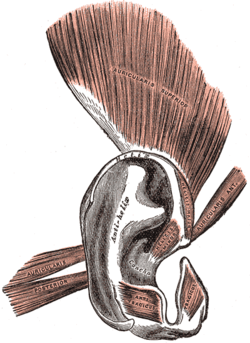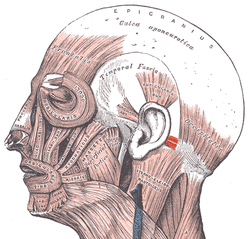Posterior auricular muscle
The posterior auricular muscle consists of two or three fleshy fasciculi, which arise from the mastoid portion of the temporal bone by short aponeurotic fibers. They are inserted into the lower part of the cranial surface of the concha.
| Posterior auricular muscle | |
|---|---|
 The muscles of the auricula | |
 Auricula in context. | |
| Details | |
| Origin | Mastoid Process |
| Insertion | Posterior ear |
| Artery | Posterior auricular artery |
| Nerve | Posterior auricular nerve of Facial nerve |
| Actions | Pulls ear backward |
| Identifiers | |
| Latin | musculus auricularis posterior |
| TA | A04.1.03.022 |
| FMA | 46857 |
| Anatomical terms of muscle | |
Post-auricular reflex
The post-auricular reflex is a vestigial muscle response in humans that acts to pull the ear upward and backward.[1] Research suggests neural circuits for pinna orienting have survived in a vestigial state for over 25 million years. It is often assumed the reflex is a vestigial Preyer reflex.[2]
References
- This article incorporates text in the public domain from page 1035 of the 20th edition of Gray's Anatomy (1918)
- Benning, Stephen D. (2011-03-01). "Postauricular and superior auricular reflex modulation during emotional pictures and sounds". Psychophysiology. 48 (3): 410–414. doi:10.1111/j.1469-8986.2010.01071.x. ISSN 1469-8986. PMC 2962877. PMID 20636290.
- Hackley, Steven A. (2015-10-01). "Evidence for a vestigial pinna-orienting system in humans". Psychophysiology. 52 (10): 1263–1270. doi:10.1111/psyp.12501. ISSN 1469-8986. PMID 26211937.
This article is issued from
Wikipedia.
The text is licensed under Creative
Commons - Attribution - Sharealike.
Additional terms may apply for the media files.